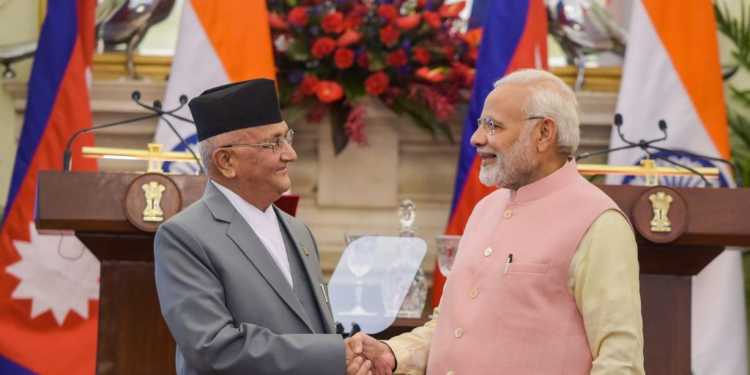With his recent Nepal visit, PM Modi has revived Indo-Nepal relations by invoking the ancient historical and cultural relations between the two countries. Though the two countries in the region are natural allies owing to their historical and cultural proximity, their relations have been embittered due to recent issues. At the time of framing of Nepalese Constitution leading to the Madhesi agitation created a difficult situation between the two countries.
The root problem that arose between India and Nepal was the conflict between Madhesi demands and two other ethnic groups, the Tharu and Kiranti. The conflict was further aggravated by the new Nepalese constitution. The new constitution had left a host of issues unresolved relating to political interests, castes and multitude of ethnicities. This followed a crisis in Indo-Nepal relations.
The Madhesi agitation of 2015 crippled the economy of Nepal. Nepal, being a landlocked country, is highly dependent on India for its crucial imports. During the time of Madhesi agitation, Nepal claimed that India has enforced an unofficial blockade on Nepal which led to an economic crisis in the country. However, India absolutely denied this allegation and contended that it was because of the Madhesi agitation in Nepal that its economy suffered. It was clear that a misunderstanding had plagued the historical relations between the two countries.
Even as Indo-Nepal relations deteriorated suddenly, the Chinese saw a wonderful opportunity of forging better relations with Nepal to the prejudice of Indian interests. The then prime minister of Nepal, Oli emerged as a vocal critic of New Delhi’s policy towards Nepal and declared his intention of pressing ahead with closer Nepal-China ties. In fact, he managed to secure China’s support during the six-month long blockade. In fact, even after resigning, he tried scapegoating India by alleging that India interfered with local affairs of Nepal and forced a change in government by causing the Maoists to withdraw support from his government. Bitter Indo-Nepal relations had become an electoral issue and the closeness between China and Nepal was hurting India in a very bad way.
The Chinese outreach to Nepal and a period of cold Indo-Nepal relations was criticised severely within India and it was claimed that to rake up the Madhesi issue was a major mistake on the part of the Indian government. There were grave concerns regarding the future of Indo-Nepal relations. Many had concluded that the relations between the two countries were in doldrums. PM Modi came to the fore at this critical juncture and made sure that Indo-Nepal relationship is given a kick-start. This visit was a much needed reassurance of the fact that true development in Nepal is not possible without Indian aid and that India is an all-weather ally to Nepal. Indo-Nepal alliance is a permanent feature in the region and the blockade was a mere misunderstanding between the two countries. The Chinese outreach to Nepal and warmth in relations between the two countries which was overstressed by many was nothing but a temporary political arrangement. PM Modi rightly appealed to long standing civilizational and historical relations between the two countries in order to reaffirm that India wants a cohesive, united and peaceful Nepal. The initiation of Janakpur-Ayodhya bus service is an attempt to take both the Nepalese government and people in confidence given the close proximity between the two countries as far as their societal norms and historical backgrounds are concerned.
PM Modi has realised that India must proceed with great caution as far as Nepal is concerned. Nepal’s importance has risen especially after the Doklam stand-off. Any Chinese presence or attempt to influence Nepal should be proactively checked by India. Five of the Indian states share open borders with Nepal and therefore need vigilance on India’s part to make sure that there is no Chinese presence hampering India’s interests. Recent visit of PM Modi has gone a long way in ensuring that Nepal again views India as a natural ally and the misunderstandings or insecurities caused by the Madhesi issue are resolved for good.




























